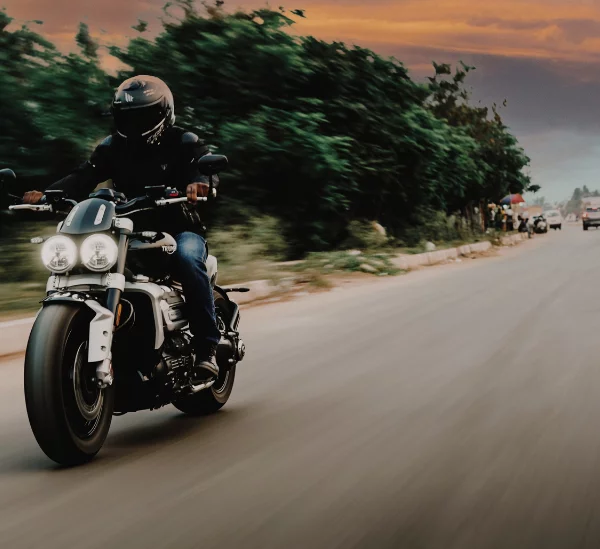Motorcycle Safety Tips and Requirements

Riding a motorcycle can be one of life’s most enjoyable experiences. Motorcyclists enjoy the thrill of the open road, the feel of the wind, and the greater freedom that comes with riding on two wheels instead of four.
However, riding a bike comes with its fair share of dangers and considerations too. Motorcyclists are much more likely to be involved in a deadly wreck or experience catastrophic injuries than their car-driving counterparts, so it’s important to keep as safe as possible on every ride.
Gordon McKernan Injury Attorneys have compiled a list of motorcycle safety tips to help you keep your bike—and yourself—in good shape.
Motorcycle Safety Tips When You’re Driving:
1. Take Courses so you Know How to Stay Safe on a Motorcycle
Before taking your first ride, sign up for a basic safety course to learn motorcycle safety tips on the road. In a safety course, you’ll also learn what to do in various unpredictable riding situations, like inclement weather, heavy traffic, and others. Driving a motorcycle is quite different from driving a car, so it’s important to take a course to confirm you know how to stay safe on a motorcycle.
Even if you’ve been riding for a while, you can still benefit from an advanced riding course. These courses teach skills like collision avoidance, advanced turning, and control and braking techniques.
2. Check the Weather Before You Ride
Motorcycle safety precautions are important, one of them being to check the weather condition before you get on the road.
Inclement weather, like rain, ice, snow, and sleet, is even more dangerous for bikers than other drivers. Motorcycles have less traction and less visibility than a car, so if it’s going to be less than sunny, save the ride for another day.
3. Wear Appropriate Gear
The reason why you see motorcyclists in leather jackets, thick blue jeans, and wearing a helmet is because that gear helps protect them from the road in the event of an accident. When it comes to motorcycle safety tips, the right gear can also help protect you from the elements and debris that other vehicles may kick up, too.
Louisiana law requires a DOT-approved, motorcycle-rated helmet for everyone who rides on a motorcycle. Helmets must have padding, lining, a visor, and a chin strap that must be fastened while in use.
4. Inspect Your Motorcycle Before You Get On It
Before every ride, inspect your motorcycle’s headlights, tail lights, turn signals, brakes, fuel and oil level, tire pressure, mirrors, handlebars, and horn to make sure they’re still working. This is especially important if you haven’t ridden in a while, or if it’s your first ride of the season.
Taking an extra five minutes before your ride can save you from a lifetime of recovery if one of those parts fails while you’re on the road.
5. Be a Good Citizen on the Road
Remember—you share the road with cars, trucks, and even other motorcyclists. Make sure to follow posted speed limits, signal your turn, and follow traffic rules where you ride. According to the Insurance Institute for Highway Safety (IIHS), nearly half of all motorcyclist deaths are caused by excessive speed.
In Louisiana, motorcycles are subject to the following regulations on the road:

- Lane laws apply to motorcycles just as they do to cars. You’re allowed to take up the entire lane in your motorcycle,
- Your motorcycle must have proper lighting. This means one or two white headlights, at least one red taillight with visibility to 1,000 feet, at least one red rear reflector, and at least one brake light. Motorcycles are not required to have turn signals, but if yours doesn’t, you must use hand signals.
- You must have unimpeded control of your bike. A permanent, forward-facing seat is required. You must not carry bundles, packages, or other objects that interfere with your ability to keep both hands on the handlebars.
- and others – it’s your responsibility to keep track of changing rules and regulations of the road.
6. Be Visible and Vigilant
Because they’re smaller and car drivers don’t expect them, motorcyclists can’t assume they’re visible to other drivers at all times. The National Highway Traffic and Safety Administration (NHTSA) reports that around three-quarters of accidents involving motorcycles are caused by the other driver’s inability to see the motorcycle. Stay safe by avoiding blind spots, driving with your headlights on, and wearing reflective or bright clothing.
While you’re helping others look out for you, be sure you also look out for other drivers. Drive defensively, and watch for obstructions in the road that could make you lose traction or otherwise lose control of your motorcycle.
7. Carry a First-aid Kit
If you want to know how to stay safe on a motorcycle, it’s always a good idea to have a first-aid kit. This kit should include bandages, hand sanitizer, disinfecting wipes, gauze, and adhesive tape. It’s not a bad idea to have aspirin or other painkillers in there, as well.
Safety Tips for Driving Around Motorcycles on the Road
Motorcycle safety precautions go beyond the individual driving one. Driving around motorcycles requires extra caution and awareness due to their smaller size and vulnerability on the road.
Motorcycle safety tips to consider when driving around motorcycle riders:
- Increase your following distance: Motorcycles have a shorter stopping distance compared to cars. Maintain a safe following distance of at least three seconds to allow yourself enough time to react to any sudden maneuvers.
- Check your blind spots: Motorcycles can easily disappear in blind spots, so make sure to check your mirrors and look over your shoulder before changing lanes or making turns.
- Signal your intentions early: Always use your turn signals well in advance to give motorcyclists enough time to anticipate your actions. Sudden lane changes or turns can catch them off guard.
- Avoid tailgating: Tailgating a motorcycle is extremely dangerous. Give motorcyclists enough space in front of you to maneuver and react to any potential hazards.
- Be cautious at intersections: Intersections are high-risk areas for motorcycles. Look twice and take an extra moment to ensure there are no approaching motorcycles before proceeding.
- Never assume their intentions: Motorcyclists may change lanes, position themselves differently, or use hand signals that may differ from what you expect. Avoid making assumptions and always prioritize caution.
- Be mindful of road conditions: Motorcycles are more affected by road hazards like potholes, gravel, or oil spills. Be aware of these conditions and avoid creating additional hazards for them, such as splashing water or debris.
- Use your mirrors effectively: Regularly check your mirrors to maintain situational awareness. If a motorcycle is behind you, avoid sudden braking, as they require less distance to stop and may not expect it.
- Be patient and give space during lane splitting: In some jurisdictions, motorcycles are allowed to lane split, which means riding between lanes of slow-moving or stopped traffic. Be aware of this possibility and give them ample space to pass safely.
- Use caution at night: Motorcycles can be harder to spot at night. Increase your vigilance, use your headlights effectively, and give motorcycles extra space and time to react.
Remember, safety on the road is a shared responsibility. Being attentive, patient, and considerate towards motorcyclists can help prevent accidents and ensure a safer driving environment for everyone.
What to Do If You Are In a Motorcycle Accident

Even with all the motorcycle safety tips in the world, accidents happen. If you’ve been in a motorcycle accident caused by another driver’s negligence, you could be facing mounting medical bills, lost wages, or a decreased quality of life.
A motorcycle accident attorney in Louisiana with Gordon McKernan Injury Attorneys is on standby, ready to help you get the financial compensation you deserve after a debilitating injury. Give us a call, toll-free, at 888.716.2572 for a free legal consolation. We’ll help you file paperwork, prepare arguments, and even take your case to court if need be. If you don’t win your case, you won’t owe us a dime, that’s the G Guarantee.

